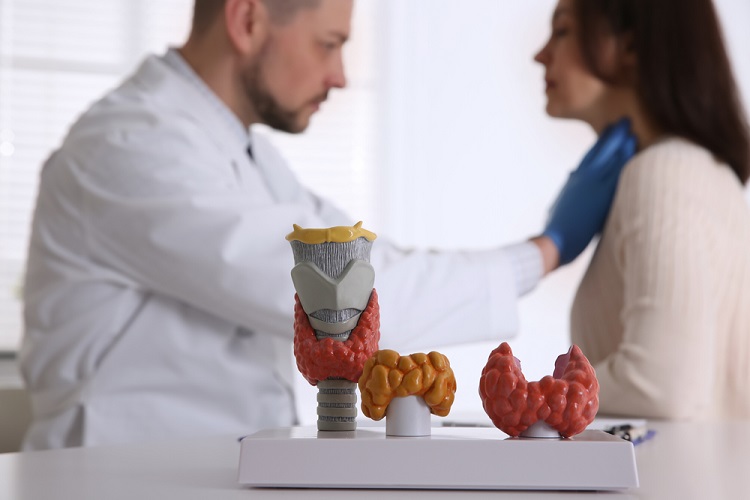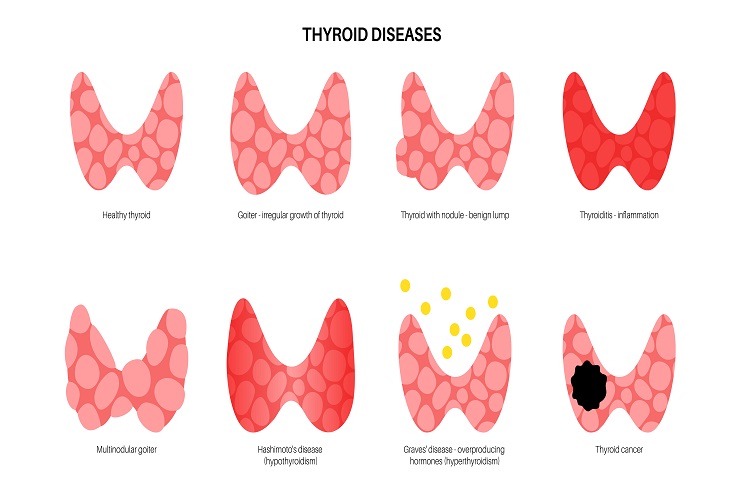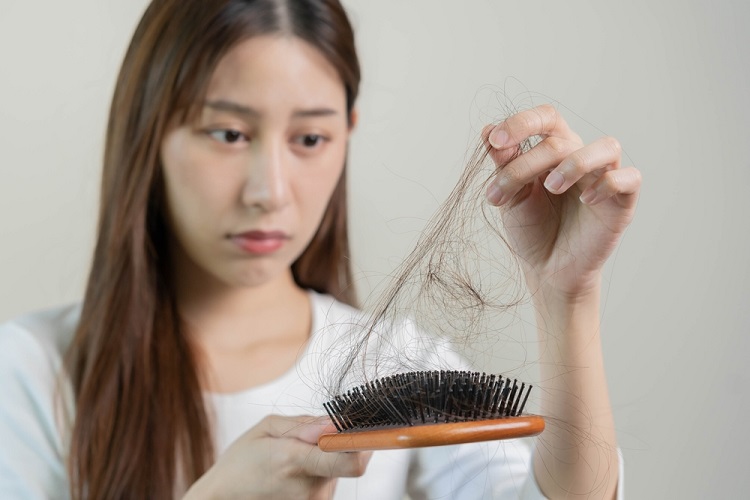Thyroid Problems, Treatments, & Preventions
Thyroid disorders affect nearly 20 million Americans. One out of every eight women suffers from thyroid disorders. Most people are unaware of the impacts of thyroid disorders. Thyroid problems can affect nearly everyone since the thyroid is the body’s thermostat — constantly regulating things like hunger levels, temperature, and energy.

What Is The Thyroid?
The thyroid gland regulates many aspects of metabolism and releases various hormones. These hormones enable the body to perform crucial functions such as digestion and reproduction. The level of hormones produced by the thyroid and pituitary gland, whether it is too much or too little, can determine a person’s struggle with mood and health.

Types Of Thyroid Problems
The most common thyroid problems include hyperthyroidism, hypothyroidism, and an enlarged thyroid.
Hyperthyroidism is an overactive thyroid. In hyperthyroidism, the thyroid produces hormones in excess. The thyroid speeds up the body’s metabolism which may result in a rapid heartbeat, trouble maintaining a healthy weight, and difficulty eating.
Signs you may be experiencing symptoms of hyperthyroidism include:
• Thin hair
• Large, bulged eyes
• Trouble sleeping
• Anxiety and nervousness
• Irregular bowel movements
• Excessive sweating
• Speedy heart rate
• Loss of weight
• Weak muscles
Hypothyroidism, the most common thyroid problem, is an underactive thyroid. It mostly impacts women between the ages of 30 and 50. Hypothyroidism slows your body down, which causes symptoms like weight gain, sluggishness, and brain fog.
Signs you may be experiencing hypothyroidism include:
• Sudden weight gain and less motivation to exercise
• Depression and anxiety
• Fatigue
• Moodiness
• Digestive issues
• Muscle aches and pains
• Raspy voice
• Dry hair and change in skin texture and appearance
• Feeling chilly frequently
Goiters, also known as enlarged thyroids, develop in people due to a lack of iodine in their diet. Iodine is essential to thyroid function. Even though goiters are rare, they can happen to anyone who fails to eat a balanced diet for an extended period.

Warning Signs Of Thyroid Problems
A way to indicate if you may be experiencing thyroid problems is to check if you have these warning signs:
• Swollen face
• Lack of exercise and muscle fatigue
• Change in focus
• Skin dryness
• Digestive issues
• Weight gain
• Change in menstrual cycles
• Cold body temperature
• Thinning hair
• Breast tenderness in women

What Causes Thyroid Problems?
Many factors can contribute to thyroid problems, including genetics and poor lifestyle habits, such as eating too many inflammatory foods, exercising too much or too little, and not getting enough sleep.
Thyroid problems are associated with the following risk factors: too much alcohol and caffeine consumption, lack of iodine and zinc, poor gut health, and genetics.
The cause of hyperthyroidism can be Grave’s Disease and excessive production of thyroid hormones. The cause of hypothyroidism can be Hashimoto’s thyroiditis, an autoimmune disorder that makes the body attack the thyroid and its cells. One may get Hashimoto’s disease by having nutrient deficiencies and high amounts of stress. Another cause of an enlarged thyroid is an iodine deficiency.

Thyroid Treatments And Preventions
Because hyperthyroidism and hypothyroidism affect the body differently, they should be treated differently. Thyroid problems can be treated with both natural remedies and medicine. The most common treatment for hyperthyroidism in the United States is radioactive iodine. Anti-thyroid medications are then used to reduce and normalize the thyroid’s function.
The most common treatment for hypothyroidism is synthetic thyroxine or T4. A person who does not respond to the synthetic version or T4 and T3 can take a combination of these two. It is possible to remove the thyroid gland through surgery. However, this procedure can have side effects, is expensive, and can sometimes not be effective. If this procedure needs to be done, the patient may need to take medication afterward.
Natural remedies for treating thyroid disorders like hyperthyroidism and hypothyroidism can include removing toxic chemicals from everyday products, managing stressful situations, and reducing inflammation. Another natural remedy is to consume zinc, selenium, and iodine through foods.
The thyroid is an important gland in the body but can also cause problems if the hormone production is changed. Although thyroid problems are common and affect many Americans, it’s nice to know there are medicinal and natural remedies to help treat and prevent thyroid problems. Talk to your doctor or health care provider to see if you are experiencing thyroid issues and how you can solve them.
